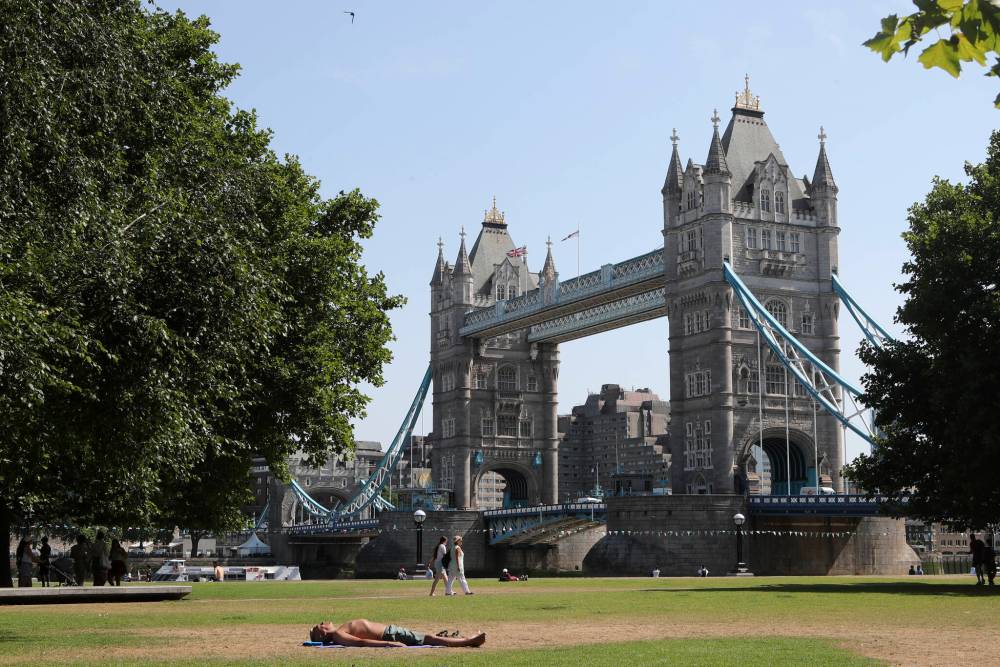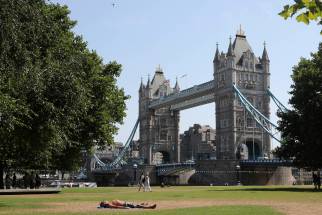Feeling the heat Science seized by culture wars of ‘us’ and ‘them’ as temperatures keep climbing
Read this article for free:
or
Already have an account? Log in here »
To continue reading, please subscribe:
Monthly Digital Subscription
$0 for the first 4 weeks*
- Enjoy unlimited reading on winnipegfreepress.com
- Read the E-Edition, our digital replica newspaper
- Access News Break, our award-winning app
- Play interactive puzzles
*No charge for 4 weeks then price increases to the regular rate of $19.00 plus GST every four weeks. Offer available to new and qualified returning subscribers only. Cancel any time.
Monthly Digital Subscription
$4.75/week*
- Enjoy unlimited reading on winnipegfreepress.com
- Read the E-Edition, our digital replica newspaper
- Access News Break, our award-winning app
- Play interactive puzzles
*Billed as $19 plus GST every four weeks. Cancel any time.
To continue reading, please subscribe:
Add Free Press access to your Brandon Sun subscription for only an additional
$1 for the first 4 weeks*
*Your next subscription payment will increase by $1.00 and you will be charged $16.99 plus GST for four weeks. After four weeks, your payment will increase to $23.99 plus GST every four weeks.
Read unlimited articles for free today:
or
Already have an account? Log in here »
Hey there, time traveller!
This article was published 21/07/2022 (1238 days ago), so information in it may no longer be current.
Part of the tarmac at London’s Luton Airport melted on Monday, as the United Kingdom sweltered in a rare and dangerous heat. For the first time, a national red warning was declared for extreme temperatures; a new record high temperature was recorded at 39.1 C. It’s common and bearable in more southern climes, but the U.K. was not built for this.
It isn’t just the U.K. either. On Twitter, climate journalist Simon Evans compiled a collection of newspaper front pages from across the world. Seen this way, as a whole, the headlines are viscerally alarming. Chunks of Spain and France are burning. Bosnia is “on fire,” Slovakia is “in for a scorcher” and across Europe, thousands are already dead.

Those who tend to shrug off climate change are not alarmed. “Heat in the summer is not shocking,” one person said on social media, which is true. Summer heat is normal and wildfires always happen, as do extreme weather events. What isn’t normal is the way all of these things have so steadily become more frequent, more intense and more broadly widespread.
When you collect climate data on charts, the extremes tend to cluster most tightly on the most recent end.
This has all been said before, of course. It has been reported ad nauseam. We’ve seen the charts. We’ve heard from countless scientists explaining what they mean, and how the varied impacts of climate change will affect everything from urban lives to oceans to agriculture. The body of scientific evidence is vast, and points in one direction: we are facing a looming crisis.
Taken on its own, that fact would be manageable. Crises usually have solutions. They can be understood and addressed. But that would require operating from an agreed-upon set of facts. Instead, facts about climate change have been swept into the rupturing fault lines of our culture, twisted into stand-ins for broader divisions about what the truth of the world is.
Facts about climate change have been swept into the rupturing fault lines of our culture, twisted into stand-ins for broader divisions about what the truth of the world is.
Consider how, on Wednesday, American conservative commentator Matt Walsh took to the social media platform to take a jab at advocacy against the climate change threat. “Remember when they spent years telling us to panic over the hole in the ozone layer and then suddenly just stopped talking about it and nobody ever mentioned it again?” he wrote.
Around the same time, he added, “they scared school children into believing that ‘acid rain’ was a real and urgent threat.”
Tens of thousands of people rushed to respond to him and assert the truth, which is that both issues are, in fact, powerful lessons in support of climate action. Because the threat of both was real, and in both cases addressed; that occurred most powerfully in 1987, when the world united via the Montreal Protocol to phase out ozone-depleting chemicals.
It was an unprecedented level of global co-operation. All United Nations members signed on, 197 parties in all, and together they eliminated the use of almost all ozone-depleting substances. The ozone layer stabilized and then began to recover, and the protocols are routinely evaluated and updated. In the U.S. and other countries, similar stiff action fixed acid rain.
The world united via the Montreal Protocol to phase out ozone-depleting chemicals. It was an unprecedented level of global cooperation.
The lessons of these two issues, in other words, are the exact opposite of the point Walsh tried to make. Scientists found a problem, governments responded, and thanks to massive global co-operation, the problem was solved. The lesson of these issues isn’t one about “panic” or overreaction. It’s that the world took the alarms seriously, and reacted enough.
Walsh must have seen these responses, many with links to exhaustively detailed reports on how environmental regulations and robust global co-operation solved both threats. But he never admitted he was wrong, and never added a correction. His real message had nothing to do with truth; it had everything to do with reinforcing the battle lines of culture.
Note the wording he used. “They” told “us” to panic, he wrote. “They” scared school children. He didn’t specify who he meant by “they,” because historic specificity wouldn’t serve his main point. (The “they” of the ozone layer threat, for instance, would include Ronald Reagan, who made tackling the problem and spearheading global co-operation a focus of his presidency.)
This framing isn’t uncommon, but it’s revealing and alarming. It shows just how dramatically science has been seized in the wars of culture, divided into camps of a “them” and an “us.” Walsh knew his target audience would fill in that “they” with an image of everyone they disagree with on a far broader range of issues, everyone they resent, everyone they distrust.
What makes this even more disturbing is that the ozone depletion threat, and the inspiring global response, are not distant events. They are well within living memory, and still actively being addressed. Yet already the haze of distance has begun to fall on their lessons. It’s not that nothing happened. It’s that it did, dramatically, and some of us just forgot.
The ozone depletion threat, and the inspiring global response, are not distant events. They are well within living memory, and still actively being addressed. Yet already the haze of distance has begun to fall on their lessons.
So here we are at this surreal point where, 35 years after the Montreal Protocol was first agreed upon and just three since its most recent amendment went into effect, its lessons have been so effectively wiped from discourse that we have to write pieces like these. We have to assert that those events weren’t a myth told to scare children, but that they were real, and we fixed them.
Anthropogenic climate change is real, too. It is backed by the same sound science and evidenced by the escalating extremes of climate. We’re not helpless against it. We could fix it. We have the tools and the creativity to find solutions, and this ought not be a socially or politically divisive effort, since it affects everyone.
But it is politicized, and every year more dramatically so, to the point that it can now be wielded on its own as a wedge, as a thing perpetrated against an “us” by a deliberately unspecified “them.” Meanwhile, global average temperatures keep rising, countries keep burning and the extremes of climate data keep clustering on the most recent ends of the charts.
All this, while humans come face-to-face with the worst of ourselves: it’s too easy, it turns out, to tear us apart.
melissa.martin@freepress.mb.ca

Our newsroom depends on a growing audience of readers to power our journalism. If you are not a paid reader, please consider becoming a subscriber.
Our newsroom depends on its audience of readers to power our journalism. Thank you for your support.











